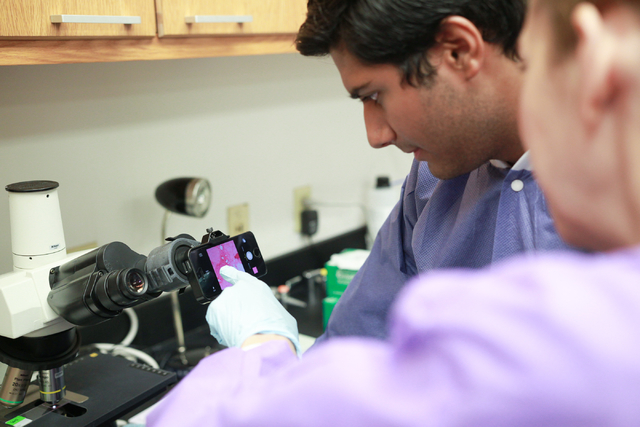UNLV camp trains science-minded teens

Ulises Sanchez knew he wanted to study science, but it was hard to picture what a career in the field would be like from his vantage point as a high school senior.
After spending the summer working in a real lab and talking with researchers about their occupations, the 17-year-old said he has a better idea of what a life in science involves.
Sanchez was one of six Clark High School students chosen to participate in a three-week, intensive science camp at the UNLV.
The camp was co-directed by Barbara St. Pierre Schneider, an associate professor in the UNLV School of Nursing, and Joanna Jezierska, director of multicultural programs for UNLV’s engineering, sciences, health sciences and nursing programs.
Schneider had received a federal grant that required her to do outreach to students and encourage them to pursue STEM (science, technology, engineering and mathematics) fields, so the camp was a perfect fit, Jezierska said. The grant, awarded by the Department of Defense, amounted to $443,766 and was used primarily to purchase lab equipment for UNLV.
Because Schneider’s lab could accommodate only a limited number of students, the co-directors targeted juniors and seniors in the high school’s advanced placement biology classes for applications.
In addition to being a regular high school, Clark offers a magnet program in math, science and applied technology. Students had to write an essay and provide two recommendation letters. Five faculty members judged the 11 applications, factoring in GPAs. UNLV provided about $2,000 to fund the program, Schneider said.
The students worked in Schneider’s lab and also took field trips to other labs on campus. Schneider focused on teaching the students research skills while Jezierska helped them with study skills and personal development. For example, Jezierska had all of the students take a personality test.
The students met Monday through Thursday from 9 a.m. to 2 p.m., with guest speakers coming almost every day.
“You can see (the researchers) actually make a living,” Sanchez said. “You can see what they do has a purpose in the world.”
Schneider said she tried to expand students’ awareness of the kind of work that happens in a lab since high school science classes have limited resources and a limited purpose.
Kataryna Jaworsky, 16, said she was thrilled to be trusted with handling expensive equipment. Jaworsky said she thinks the lab skills she learned — learning how to make a dilution series, how to use an inverted microscope, how to stain microscope slides — will give her an edge in college.
The camp culminated in a presentation to some faculty and classmates, giving the students a chance to practice translating data into a story.
Ian Macato, 16, called the camp eye-opening. He hadn’t realized how crucial writing is for research, he said, explaining it was interesting to learn about how scientists must be skilled grant writers to snag funding.
The highlight, students agreed, was having the chance to talk to researchers and explore working labs.
Kahyun Lee, 16, said it was a relief to learn researchers faced many of the struggles she is experiencing. Lee said she knows she wants to go into a STEM field, but is still figuring out what that will be like. Lee said she feels more comfortable with where she is at after hearing faculty members talk about how it took them a while to figure out their career goals.
Lee said the camp changed her perspective on UNLV, which she said isn’t a popular choice among her peers. She wouldn’t have considered going to the school before, but the camp put UNLV on her list of options, Lee said.
That’s part of the camp’s mission.
Jezierska, who goes to several Clark County School District campuses to recruit, said these students are bright and will be able to pick from several schools nationwide.
“Our goal is to keep them in state,” she said. “We want them to choose us.”
Contact Bethany Barnes at bbarnes@reviewjournal.com or 702-477-3861. Find her on Twitter: @betsbarnes.